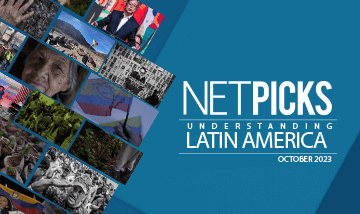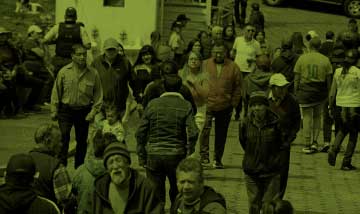Understanding Latin America
Dear readers and colleagues, this month we bring you five articles that reflect the reality of Latin America: one each from Brazil, the Dominican Republic and Ecuador, plus an analysis of resource politics in the region, and another on the environmental responsibilities of Chinese companies in Latin America.
Finally, we present two articles on the political situation in Germany in the run up to that country’s September general elections.
-
- Bolsonaro allies in Brazilian congress push sweeping electoral changes to keep hold on power
- Where we mine: resource politics in Latin America
- China struggles with socio-environmental standards in Latin America
- Dominicans of Haitian descent are living in a stateless nightmare
- Indigenous Amazonian communities bear the burden of Ecuador’s balsa boom
- Germany: Election in Crisis Mode; Die Linke and the 2021 Federal Elections
.
BOLSONARO ALLIES IN BRAZILIAN CONGRESS PUSH SWEEPING ELECTORAL CHANGES TO KEEP HOLD ON POWER
Brazil has suffered nine coup d’états over the last two centuries, including the U.S.-backed coup in 1964 that led to a brutal 20-year military dictatorship. Now, as a result of his latest statements and plans to change the electoral system, some fear that President Jair Bolsonaro is laying the foundations for another. Amongst the changes being promoted by Bolsonaro are: allowing votes for individuals and/or parties, which given the plethora of candidates would clearly favor those with money and/or influence; allowing female candidates to use their federal campaign funds for another candidate; and reducing the control of the judicial electoral system. According to Vânia Aieta, a practicing electoral attorney, “it’s a project that strengthens the oligarchies… the political sharks would all be elected, and you would eliminate all of the opposition”. Up to now most of the attention has been focused on another recently defeated proposition; this would have required paper ballots as well as the electronic voting system, on the basis, as Bolsonaro ally Rep. Margarete Coelho put it, that the system is “too noisy”. Bolsonaro himself has stated that without paper ballots “…it is a sign that there will be no election,” a statement that has found backing with some military figures. Says the author: “While it is uncertain if any of the proposals will pass in time, they serve as a window into the priorities of the Bolsonaro government and its allies in the Centrão, a broad coalition of political parties that serves the interests of the nation’s oligarchs.”
Andrew Fishman, August 11th, 2021
https://theintercept.com/2021/08/11/bolsonaro-brazil-congress-elections-2022/.
WHERE WE MINE: RESOURCE POLITICS IN LATIN AMERICA
As the drive to expand renewable energy capacity gathers momentum, greater demand for lithium and other materials will increase mining in Latin America. The question is how this will impact the indigenous communities and workers that have historically suffered the effects of mining. In this thoughtful interview, Thea Riofrancos, author of Resource Radicals, explains how the energy transition in the Global North will require structural changes if in the name of fighting climate change, it is not to continue the inequality of previous forms of resource extraction. According to Riofrancos “the transition to renewable energies is often thought of as switching one energy source for another: fossil fuels for renewables. That’s part of it, but this transition fits into a much bigger energy and socio-economic system. You can’t just swap energy sources without rebuilding the infrastructures and technologies required to harness, generate, and transmit that energy. All this has a large material footprint and requires materials such as lithium, cobalt, nickel and rare earth metals. More traditional extractive sectors like copper are also very important for decarbonisation.” What’s concerning about lithium for example, is the social and environmental impact of its extraction: who benefits and who pays the cost. “The problem”, says Riofranco, “is not only that certain communities face harm as result of extraction. It’s also that they suffer those harms so that someone else, probably an affluent person elsewhere in the world, can drive an electric vehicle. Lithium batteries surface various tensions, trade-offs and inequalities of global capitalism.”.Annabelle Dawson and Thea Riofranco, August 17th, 2021
https://lab.org.uk/where-we-mine-resource-politics-in-latin-america/.
CHINA STRUGGLES WITH SOCIO-ENVIRONMENTAL STANDARDS IN LATIN AMERICA
In Latin America and the Caribbean there are at least 983 conflicts over mining, energy, transportation and communications projects, some of which are financed by Chinese firms; the region attracted 138 Chinese infrastructure projects between 2005 a2009 with a total value of US$ 94.09 billion. Not all have been well received by local populations, and many questions have been raised about Chinese companies and banks willingness to take social and environmental issues into consideration. In southeast Mexico, work on the Yucatan Solar Park, owned by the Chinese company Jinko Solar, has been halted since 2020 for lack of appropriate consultation with indigenous communities. In 2016 Argentina Supreme Court halted work on hydroelectric power plants financed by the China Development Bank (CDB) and the Industrial and Commercial Bank of China (ICBC), until a public hearing and a new environmental impact assessment were conducted. The project was consequently suspended for two years. According to Enrique Dussel, director of the Mexico City based Centre for China-Mexico Studies, the debate on environmental safeguards is something new for the Asian super power. “Historically”, he says, “Chinese companies have shown great political pragmatism, the banks are interested in doing business and it did not matter if it was in activities that could be questioned from an environmental standpoint. The question was to mark a presence and participate in the Latin American market. Chinese pragmatism in these aspects practically leaves the responsibility up to the counterpart.”. Emilio Godoy. August 4th, 2021
http://www.ipsnews.net/2021/08/china-struggles-socio-environmental-standards-latin-america/
DOMINICANS OF HAITIAN DESCENT ARE LIVING IN A STATELESS NIGHTMARE
Over the last hundred years, Haitian laborers came to the Dominican Republic to harvest sugar cane. Known locally as Braceros, these workers were promised good working conditions and stable employment, but their temporary settlements with poor living conditions eventually became permanent. The children and grandchildren of these workers, born in the Dominican Republic, were initially considered to have Dominican citizenship, but in 2013, the Republic’s Constitutional Court stripped citizenship from about two hundred thousand Dominicans of Haitian descent. The government was forced to acknowledge the injustice of the situation after an international outcry, and in 2014 passed Naturalization Law 169-14 in an attempt to settle the problem. But the problem was not settled. Seven years later, many Dominicans of Haitian descent still find themselves stateless, and at the mercy of Dominican immigration authorities who could deport them to Haiti, a country they have never lived in. “They wanted us to come and cut their sugarcane,” explains Alfredo Oguisten, cofounder of Reconoci.do, a movement of Dominicans of Haitian descent formed to demand nationality rights. “They never wanted or expected us to be equal citizens in their country.” The result of the Dominican Republic’s policies is a living nightmare of statelessness, discrimination and permanent insecurity..Jaclynn Ashly, August 20th, 2021
https://www.jacobinmag.com/2021/08/dominican-republic-haitian-descent-stateless-nightmare-citizen-rights
INDIGENOUS AMAZONIAN COMMUNITIES BEAR THE BURDEN OF ECUADOR’S BALSA BOOM
Ecuador became the world’s leading exporter of balsa wood in 2015, and two years later had doubled the value of its exports: China being the country’s main balsa export destination. The negative is that the Amazon communities where the wood is found have been affected by the incursions of loggers and the destruction of their environments. The problem is a lack of any real official control over a trade which extends to both sides of the Ecuador-Peru border. According to Álvaro Pérez, biologist and lecturer at Ecuador’s Catholic University: “One of the biggest issues with the ministry [of environment] is that it doesn’t have good forest control and that’s why legal logging, to say it in a way, has been permitted, as well as illegal logging.” According to reports, loggers are even beginning to harvest other types of wood in areas where most of the balsa has been taken. And while President Guillermo Lasso has recently been making encouraging statements about environmental responsibility, he is also promoting greater oil exploration, leading some to doubt the solidity of his promises. Some Amazon communities have tried to adapt to the situation, for example the indigenous Achuar who are attempting to blend conservation with the market, while others such as the Sapara have instituted a total ban on the sale of Balsa in their territory. There are also other issues of concern. The balsa trade may also be leading to increased drug use in Indigenous communities, as after taking the valuable trees, some loggers have been planting coca and marijuana. As the Peruvian side is also being affected, a Peruvian Wampi community leader is calling for joint action to solve the problem.. Diego Cazar Baquero, August 17th, 2021
https://news.mongabay.com/2021/08/indigenous-amazonian-communities-bear-the-burden-of-ecuadors-balsa-boom/
THE PRE-ELECTION SITUATION IN GERMANY
This month we also bring you two articles on the political situation in Germany in the lead up to the September 26th general elections. The articles examine the reasons for an unusually unstable situation in which the parties leading the polls a few months ago now seem set to lose, while the social democrat SPD, which seemed destined to further decline is now on the rise. The options for the left and in particular for Die Linke, the only left wing party in the German parliament, are also uncertain.Election in Crisis Mode
As the Merkel era comes to a close, who will Germany choose to take her place?
https://www.rosalux.de/en/news/id/44873/election-in-crisis-mode
Albert Scharenberg, August 31st, 2021 - Die Linke and the 2021 Federal Elections
The party faces a disadvantageous political constellation, strong counterforces, internal conflicts, and stagnation.
Mario Candeias, August 25th, 2021
https://www.rosalux.de/en/news/id/44850/die-linke-and-the-2021-federal-elections





